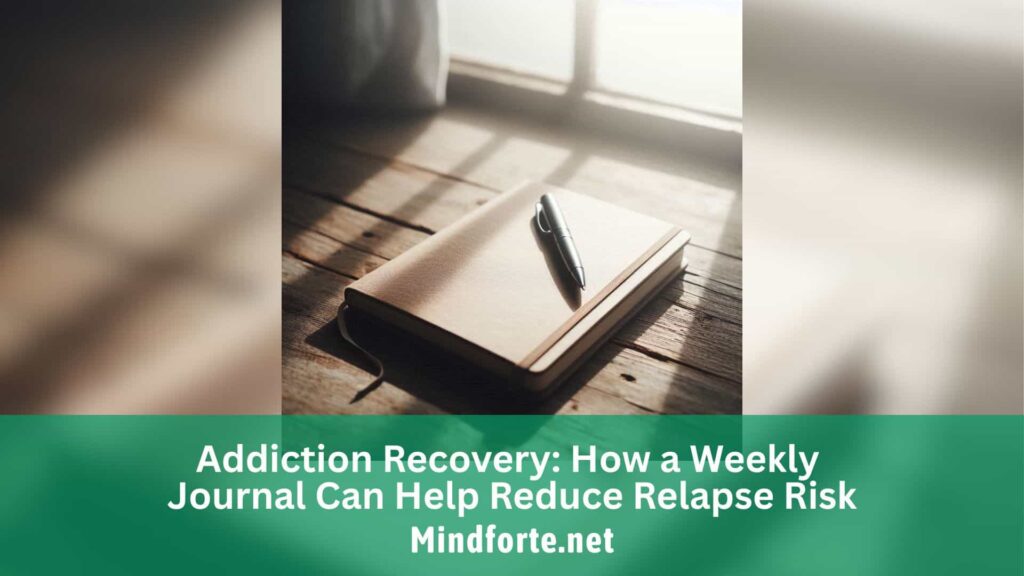Many people in recovery carry a fear they rarely say out loud – the fear of going back.
Even after weeks or months of progress, cravings or old habits can return. It can feel sudden and exhausting.
In Nigeria, this fear is harder to talk about.
Society often misunderstands relapse.
Friends may say, “Just be strong” or “Pray more and it will go away.”
Strength and prayer matter, but they don’t replace structured psychological help.
One simple tool can make a difference: a weekly journal habit designed for relapse reduction.

Why Relapse Happens – and Why People Stay Silent
Relapse may be seen as a weakness. But it’s often the result of triggers, stress, and unprocessed emotions.
Research shows relapse is common across addictions – from alcohol to gambling to pornography – and can happen even after years of sobriety.
In Nigeria, stigma makes it worse.
Many see relapse as laziness or a lack of spiritual commitment.
This judgment keeps people from seeking help early, leaving them isolated when they need support most.
The Hidden Spiral of Silence
Here’s how relapse risk often builds:
- Unnoticed triggers – stress at work, family conflict, or loneliness quietly build up.
- Unspoken shame – fear of judgment stops people from reaching out.
- Sudden slip – the pressure becomes too much, and relapse happens.
When no one sees it coming, the guilt feels even heavier.
The Weekly Journal Habit
Journaling won’t erase relapse risk, but it can help you see it early – before it grows.
Why weekly, not daily?
Daily journaling can feel like a chore. Weekly journaling is easier to maintain and still helps you notice patterns.
Why it works:
- Expressive writing helps regulate emotions and reduce intrusive thoughts.
- CBT (Cognitive Behavioral Therapy) uses journaling to challenge unhelpful thinking.
- Addiction research shows reflective writing increases self-awareness and accountability.
How to Start
Step 1: Choose a quiet space
It could be your sitting room after everyone sleeps, a quiet churchyard, or even your parked car.
Step 2: Use prompts
- What situations tempted me this week?
- What emotions came up strongest?
- What helped me resist cravings?
- What support do I need more of?
Step 3: Be honest
Your journal is meant for noticing, so don’t use it for judging.
Step 4: Review past entries
Look for patterns. Do cravings rise when you’re stressed at work? Do family arguments trigger lapses?
Step 5: Share if you want
Some people share parts of their journal with their therapist to guide sessions.
Example Entry
Week 4 of Recovery Journal
- Trigger: Argument with my brother. He mocked me for going to therapy.
- Emotion: Anger, shame, sadness.
- Craving level (1–10): 7
- What I did: Took a walk, played Ayo with my cousin, practiced deep breathing. Craving dropped to 3.
- Reflection: Family pressure is a big trigger. I’ll discuss this in therapy next week.
Myths Journaling Helps Break
- Myth: Addiction is just lack of willpower.
Truth: Journaling shows it’s about triggers and coping skills. - Myth: Relapse means therapy failed.
Truth: Relapse is feedback – a sign to adjust your plan. - Myth: Talking about struggles brings shame.
Truth: Journaling is private and gives you words to share later if you choose.
What Changes With Consistency
When people stick to weekly journaling, they:
- Catch triggers early
- Build emotional vocabulary
- Feel less alone
- Grow in resilience
One client told me:
“I used to live afraid of my own mind. Now, with journaling, I feel like my thoughts are something I can work with, not run from.”
Final Note
Relapse prevention is about preparation, not perfection.
A weekly journal is more than writing – it’s a tool for survival, a mirror for honesty, and a guide for growth.
If you’ve been wondering whether you need therapy, journaling is a gentle way to start.
Combined with professional support at Mindforte Psychology Clinic, it can be a powerful anchor for lasting recovery.
Start with one page this week. Let your journal carry what you’ve been holding inside. Over time, those pages can carry your healing too.
Your Turn:
What’s one thing you’d write in your journal today if nobody could judge you? Share in the comments – your courage might help someone else.
References
- National Institute on Drug Abuse (NIDA). (2018). Understanding Drug Use and Addiction. https://nida.nih.gov/publications/drugfacts/understanding-drug-use-addiction
- Pennebaker, J. W., & Smyth, J. M. (2016). Opening Up by Writing It Down: How Expressive Writing Improves Health and Eases Emotional Pain. Guilford Press.
- Marlatt, G. A., & Donovan, D. M. (Eds.). (2005). Relapse Prevention: Maintenance Strategies in the Treatment of Addictive Behaviors. Guilford Press.


